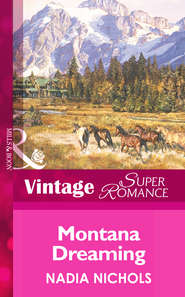По всем вопросам обращайтесь на: info@litportal.ru
(©) 2003-2024.
✖
Sharing Spaces
Автор
Год написания книги
2018
Настройки чтения
Размер шрифта
Высота строк
Поля
“Did my grandfather ever catch anything?”
“Pneumonia, after one particularly grueling night out. Then he ran into some folks who were touring on snowmobiles. They asked if they could have a ride on the dogsled, so the admiral gave them a ride. They gave him a couple of hundred bucks for his efforts, and that was the end of his trapping adventures. He sold the traps, advertised dogsled rides at the airport and in some local stores at Goose Bay and pretty soon the phone began to ring. That’s why he kept the dogs.” Jack paused with a faint grin. “Well, that’s not the entire reason. He kept them because he came to love them, and believe it or not, that brutish pack felt the same way about him.”
Senna tried to picture the admiral mushing a team of huskies down an arctic trail, clad in mukluks and a fur parka, but she couldn’t. Nor could she imagine him stroking the head of a dog with genuine affection. It was as if Jack were talking about a complete stranger. She was beginning to realize just how little she knew about her own grandfather. “Are there any pictures?”
Jack paused. “Goody has some, I think, and I have a few. Mostly fishing pictures, a few winter shots of the dog teams. The pictures your grandfather took were of wildlife. Wolves, in particular. He was fascinated by them. But if you want mushing pictures, you’ll have to dig through his papers. The admiral must have stashed some here, somewhere, probably in his desk. That’s where he kept all the important stuff. He did his writing there, too.”
“Writing?” Yet another surprise.
“He kept a journal,” Jack said, concentrating on his stitching. “He wrote in long hand into a spiral notebook every night.”
Senna imagined that the entries would be terse and to the point. Rained today. Worked on chimney. Beans for supper. That sort of thing. Still, maybe she’d get lucky. Maybe he’d bared his soul and explained why the heck he’d named her as his executor. She would read his journal when she found it, every last word. But what was she supposed to do with all his personal belongings, his clothes, the pictures on the walls. Have a yard sale? That seemed so callous, so unfeeling. Maybe an open house would be a better idea, inviting all the admiral’s friends to choose what they might want after Jack had taken what he wanted. She should, after all, give her grandfather’s business partner and closest friend first dibs.
Odd that the admiral hadn’t left anything to Jack. He could have given him his half of the business and made Senna’s job much easier, but all he’d written in his will, in neat, black ink, were two sentences. The first sentence stated, To my granddaughter, Senna McCallum, I leave all my worldly goods for her to dispose of as she sees fit. And the second; To my business partner and friend, John William Hanson, I bequeath memories of many good times shared, and hopes for even better times in the future.
How odd that he would trust her to dispose of his worldly goods as she saw fit. The admiral hadn’t thought anything she’d done to be “fit” in her entire life. As Senna pondered the relative whose blood ran through her veins, a bitter memory surfaced, one that illustrated the relationship she and her grandfather had shared. Tim had accompanied her to her father’s funeral. They’d only just begun dating and he was sweet to be so supportive during that terrible time, but her grandfather hadn’t missed the opportunity to take her aside during the family gathering held afterward at her mother’s house. “I certainly hope you’re not planning to marry that one,” he’d said in his stern and judgmental way.
“He was kind of religious about it,” Jack said, startling her back to the present.
“About what?” Senna asked.
“Writing in his journal. He’d spend an hour or so at that desk every night.” Jack had stopped stitching the harness as he spoke and was gazing across the room at the admiral’s desk as if he were seeing the old man sitting there, writing, or pacing in front of the window, smoking his pipe. “He never said much about his life, and I never asked, but I have a feeling it’s all there, in that journal.”
Senna straightened, glanced over at the massive old desk, and moved toward it. There were three deep drawers on either side and she opened the top left hand one, spying a book, but not a spiral notebook. She lifted the leather-bound ledger, embossed with gold lettering across the front: Wolf River Lodge, with a logo of a howling wolf engraved beneath it. She laid the ledger on the desk and opened it. It was a reservation book for the fishing lodge. She flipped through the empty pages until she reached the month of June and then she paused. From the last week in June on, there were names written into six of the spaces for each and every day.
She turned the pages into July and August, swiftly scanning the names, the phone numbers jotted next to them, the addresses scribbled below. People from all over the United States. People from England and France and Germany. One party from Australia was booked for three weeks solid. The bookings petered out in September, and then from November on there were occasional reservations. She supposed that was for the dogsledding, but she wasn’t sure. She closed the book and stood with her hand atop it for a moment, then picked it up and moved to where Jack worked on the harnesses.
“You said the lodge wasn’t ready yet?”
He glanced up, saw that she held the reservation book, and shook his head. “Not quite, but the majority of the work is done, there’s just a bunch of small stuff left, and about a ton of supplies to be flown in.”
“Some of these guests are scheduled to arrive just two weeks from now….”
“I know.” A look of pride crossed his face. “We’re practically booked for the summer.”
“Now that the admiral’s dead, how’s that going to work, exactly?”
“I’ll get the hired help in there right away to get the lodge ready, get the rest of the provisions flown in, find another fishing guide or two, and give ’er hell all summer long. At least, that’s the plan.”
“What if you’re not ready in time?”
“We will be.”
“Are all these reservations pretty firm?”
“They’ve all paid a deposit, and the deadline’s past for them to cancel. Don’t worry, they’ll show.”
“How much of a deposit did they pay?” Senna asked.
“Half of their stay. A lot of money.” He paused again as if considering his words carefully. “Actually, it’s a damn good thing nobody canceled, because we used all of those advance deposits to finish building the lodge.”
“I see,” she said, standing and cradling the leather reservation book against her chest. “So there is absolutely no buffer in the bank account?”
“No. Matter of fact, the business account is dead empty. The admiral’s life insurance will no doubt cover his cremation fees and legal expenses and some of his medical bills, and maybe it’ll help a lot more than that, but I had to borrow money for the wake. Goody said I could pay her back at the end of the summer.”
“Assuming you go ahead with the start-up, what were you planning to buy the food with, and how are you going to pay the help for the three weeks until the first guests depart and settle up for the balance of what they owe when they do?” Senna asked, steeling herself for the answer.
He hesitated, then jabbed the needle into the webbing again. “I was kind of hoping you’d help out,” he said, talking to the harness to avoid meeting her eyes. “I mean, we’re business partners now, for better or for worse.”
“It’s definitely for worse, and very temporary.” Senna walked back to the desk, returned the ledger to the top drawer and drew a deep breath. She wondered how she was going to juggle this latest bombshell. Was she going to have to use her entire life savings to bail her grandfather’s business out of the red? Might as well beard the giant and find out. “Exactly how much money are we talking about?” she said.
Jack didn’t hesitate. He’d obviously already figured things out. “The way I figure it, including the food and provisions, the diesel fuel for the generator, gas for the boats and the plane, insurance, wages for the employees…maybe ten thousand?”
Senna straightened her spine, raised her chin and drew a steadying breath. “Ten thousand dollars. A mere pittance. Well, I suppose I should start cooking those caribou steaks,” she said, and marched into the kitchen.
JACK LISTENED TO THE SOUNDS of domestic industry coming from the kitchen and set the mended harness aside, pushing to his feet and pacing to the window with the restlessness of a wolf. Although he’d known her scarcely six hours, he sensed that Senna McCallum had the power to destroy him. She was definitely a strong woman. The way she’d just handled that news about the business needing a financial boost had been admirable. She hadn’t batted an eyelash when he told her how much the business needed to get going, and now she was in the kitchen, calmly and considerately cooking supper for him. Clearly she was level-headed and sensible enough to realize that the lodge was worth saving. He only hoped she had enough of a nest egg in the bank to help out.
He returned to his seat and for a few quiet minutes continued stitching up harnesses and then flinched as he heard a series of loud bangs and crashes from the kitchen. The sound of the frying pan hitting the stovetop. The clatter of silverware being flung on the table. Plates hitting the counter hard enough to shatter them. He heard her muttering to herself in angry undertones, and then, very clearly, she said, “You, dog, get out of this kitchen. Go on, I won’t have you sitting there drooling while I cook!”
Chilkat skulked into the living room, casting an offended glance over his shoulder as he did. Just as Jack was about to effect his own escape from the lake house, Senna stalked into the room, brandishing a knife in one hand.
“You really expect me to clean out my savings account to float the start-up of a fishing lodge I have absolutely no interest in?”
“You own a half interest, so the way I see it, you should be at least halfway interested,” Jack corrected. “The only other alternative we have is not to open, and that’ll set you back a whole lot more because then we’d have to refund the advance deposits.”
“Which total exactly how much, dare I ask?”
“Oh, somewhere in the vicinity of thirty thousand dollars, give or take a few thousand.”
“I see.” She whirled around and stalked back into the kitchen. He heard the loud hiss as the caribou steaks hit the hot frying pan. Jack turned once again toward the door, gesturing silently to the dog, but before he could take two steps, she reappeared.
“I think it’s cowardly of you not to have mentioned these financial problems before now,” she said, waving the knife around for emphasis. “What if I don’t have ten thousand dollars?”
“Then we’d better hope the fishing’s good and all of our guests are fish eaters.”
“There are a million details in a start-up operation. You quoted ten grand, but it’ll probably be closer to twice that amount, though I won’t know until I see your set-up. How many guests can you take at a time?”
“The lodge has six guest rooms with two double beds each and can accommodate twelve comfortably, but we’d need more guides to operate at full capacity. By law, there has to be one fishing guide for every two clients.”
“How many employees?”
“Four. A housekeeper, a cook and two guides. Three guides, if I can hire another. Four would be even better.”
“Plus you. That’s seventeen or eighteen people eating three meals a day, seven days a week.”
“That’s about what I figured,” Jack said, nodding.
She spun and returned to the kitchen. More angry noises. Jack gave up on trying to escape. He knew he wouldn’t have time. Sure enough, she burst into the room again, eyes flashing. “And just how long do you think one cook is going to last with no helper and all those meals to prepare and no days off?”











